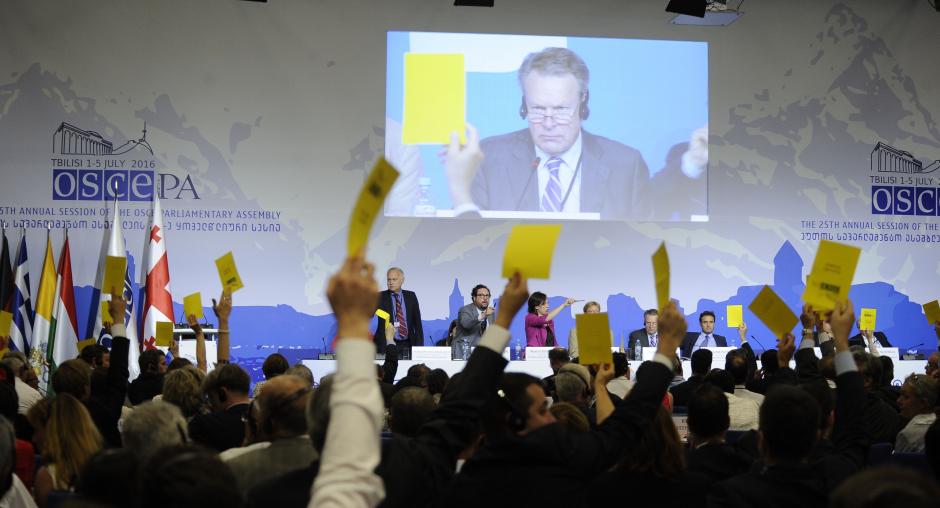OSCE parliamentarians in Tbilisi adopt wide-ranging Declaration on human rights, security and the environment

TBILISI, 5 July 2016 – The OSCE Parliamentary Assembly adopted the 2016 Tbilisi Declaration today, addressing key issues in the fields of political affairs and security, economics, the environment, human rights, and humanitarian concerns. (Full text available here in English, French and Russian.)
The Declaration, resulting from months of work by committee rapporteurs and several days of debates at the Assembly’s Annual Session in Tbilisi, contains wide-ranging policy recommendations and pronouncements, serving as policy guidance to OSCE governments and the international community. Some 300 parliamentarians from 54 countries spanning North America, Europe and Central Asia contributed to the Session’s work. The Declaration and resolutions will now be sent to parliaments and to the foreign ministers of OSCE countries as policy input ahead of the OSCE’s 2016 Ministerial Council meeting this year in Hamburg.
Among the issues covered in the recommendations adopted by the parliamentarians are transnational terrorism, the crisis in and around Ukraine, protracted conflicts in Georgia, countering corruption, energy, climate change, migration, and the rights of refugees. The Declaration is the final product of the Assembly’s 2016 Annual Session, which was held in the Georgian capital from 1 to 5 July under the theme “25 Years of Parliamentary Co-operation: Building Trust Through Dialogue.”
Stressing the theme of trust-building, the Declaration “reaffirm[s] the undiminished validity and historic role of the guiding principles and common values of the Helsinki Final Act signed in 1975, including the commitments on politico-military, economic, environmental, human rights, and humanitarian issues.” It regrets however the trend of gridlock in the OSCE and urges OSCE countries to enhance the level of co-operation in addressing common challenges.
On terrorism, the Declaration calls upon governments to strengthen co-operation and develop measures aimed at blocking the funding of terrorist organizations. It further urges the OSCE to help governments counter terrorism through pragmatic assistance and promotion of best practices.
On the crisis in and around Ukraine, the Declaration urges all parties to fully implement the Package of Measures for the Implementation of the Minsk Agreements, and “underlines respect for the principles of the inviolability of frontiers and territorial integrity, peaceful settlement of disputes, equal rights, and self-determination of peoples as stated in the Helsinki Final Act.”
Regarding climate change, the Declaration calls upon parliamentarians to promote political dialogue in order to achieve the goals set by the Paris Climate Agreement adopted last year, and to ensure that the Agreement’s targets are met “with the greatest sense of urgency by implementing robust policies and regulations on greenhouse gas emissions and facilitating the transition to a low-carbon economy.”
On migration, the Declaration stresses the importance of prioritizing the rights of those fleeing violence, and urges governments to stop imposing legal and physical barriers to the movement of people fleeing violence and to actively work toward an inclusive approach to migrants and refugees.
The Assembly also approved 15 resolutions to supplement the Declaration, addressing issues such as fundamental freedoms in the Crimean peninsula, prevention of child sexual exploitation, confidence-building measures in the Baltic Sea region, and ensuring that members of the OSCE Parliamentary Assembly affected by international travel bans are able to attend OSCE events.
For the full text of the Declaration and resolutions, as well as speeches, photos, videos and more, please visithttp://www.oscepa.org/meetings/annual-sessions/2016-tbilisi-annual-session. Additional photos are available on the Georgian Parliament’s Flickr pages at https://www.flickr.com/photos/geoparliament and https://www.flickr.com/photos/oscepatbilisi
The OSCE Parliamentary Assembly is comprised of 323 parliamentarians from 57 countries spanning Europe, Central Asia and North America. The Assembly provides a forum for parliamentary diplomacy, monitors elections, and strengthens international co-operation to uphold commitments on political, security, economic, environmental and human rights issues.
